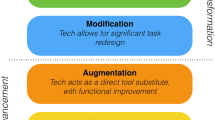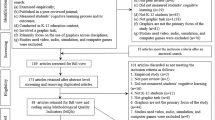Abstract
In an effort to develop a virtual technology coach for K-12 educators, this article analyzed survey results from sixty teachers with regards to specific resources that a technology coach could provide within a virtual environment. A virtual technology coach was proposed as a possible solution to provide continual professional development for teachers to support their technology integration efforts. Results indicate that the Collaboration, Discussion, Learning, and Sharing resources of a virtual technology coach are considered valuable. This finding appears to corroborate the importance of developing a professional learning community to promote effective and sustained technology integration strategies among teachers. In addition, these virtual technology coaching attributes are identified in current education coaching (NETS*C) standards pointing to a potential support structure for schools and school districts implementing the NETS*C standards.
Similar content being viewed by others
References
Beglau, M., Hare, J.C., Foltos, L., Gann, K., James, J., Jobe, H., Knight, J. & Smith, B. (2011). Technology, Coaching and Community [PDF document]. International Society for Technology in Education (ISTE). Retrieved from http://www.iste.org/learn/coaching-white-paper.aspx
Cifuentes, L., Maxwell, G., & Bulu, S. (2011). Technology integration through professional learning community. Journal of Educational Computing Research, 44(1), 59-82.
Edmodo (2012). Edmodo. Retrieved from http://www.edmodo.com
Gallucci, C., Van Lare, M., Yoon, I. H., & Boatright, B. (2010). Instructional coaching: Building theory about the role and organizational support for professional learning. American Educational Research Journal, 47(4), 919-963.
Graesser, A. C., Jeon, M., & Dufty, D. (2008). Agent technologies designed to facilitate interactive knowledge construction. Discourse Processes: A Multidisciplinary Journal, 45(4-5), 298-322.
Holmes, A., Signer, B., & MacLeod, A. (2011). Professional development at a distance: A mixed-method study exploring inservice teachers’ views on presence online. Journal of Digital Learning in Teacher Education, 27(2), 76-85.
International Society for Technology in Education (2012). Digital age coaching. Retrieved from http://www.iste.org/standards/nets-for-coaches
Lewis, L. A., Koston, Z., Quartley, M., & Adsit, J. (2010). Virtual communities of practice: Bridging research and practice using Web 2.0. Journal of Educational Technology Systems, 39(2), 155-161.
Lowther, D. L., Inan, F. A., Daniel Strahl, J. J., & Ross, S. M. (2008). Does technology integration “work” when key barriers are removed? Educational Media International, 45(3), 195-213.
Merriam, S. B. (2009). Qualitative research: A guide to design and implementation. San Francisco, CA: Jossey-Bass
Pella, S. (2011). A situative perspective on developing writing pedagogy in a teacher professional learning community. Teacher Education Quarterly, 38(1), 107-125.
Singer, J., Lotter, C., Feller, R., & Gates, H. (2011). Exploring a model of situated professional development: Impact on classroom practice. Journal of Science Teacher Education, 22(3), 203-227.
UsabilityNet (2012). Paper prototyping. Retrieved from http://www.usabilitynet.net/tools/prototyping.htm
Vanderburg, M., & Stephens, D. (2010). The impact of literacy coaches: What teachers value and how teachers change. Elementary School Journal, 111(1), 141-163.
Wei, R. C., Darling-Hammond, L., Andree, A., Richardson, N., & Orphanos, S. (2009). Professional learning in the learning profession: A status report on teacher development in the U.S. and abroad: Technical report. Palo Alto, CA: Stanford University, School Redesign Network and National School Development Council.
Wong, J. N. (2010). Searching for good practice in teaching: A comparison of two subject-based professional learning communities in a secondary school in Shanghai. Compare: A Journal of Comparative and International Education, 40(5), 623-639.
Author information
Authors and Affiliations
Corresponding author
Rights and permissions
About this article
Cite this article
Sugar, W., van Tryon, P.J.S. Development of a Virtual Technology Coach to Support Technology Integration for K-12 Educators. TECHTRENDS TECH TRENDS 58, 54–62 (2014). https://doi.org/10.1007/s11528-014-0752-7
Received:
Published:
Issue Date:
DOI: https://doi.org/10.1007/s11528-014-0752-7




